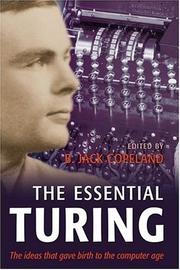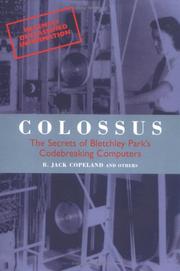| Listing 1 - 9 of 9 |
Sort by
|

ISBN: 9780199609154 9780198565932 0199609152 0198565933 Year: 2012 Publisher: Oxford: Oxford university press,
Abstract | Keywords | Export | Availability | Bookmark
 Loading...
Loading...Choose an application
- Reference Manager
- EndNote
- RefWorks (Direct export to RefWorks)
Computers --- Computer engineering --- History --- Turing, Alan Mathison, --- History. --- Turing, Alan Mathison, - 1912-1954

ISBN: 0198250797 0198250800 Year: 2004 Publisher: New York (N.Y.) Oxford university press
Abstract | Keywords | Export | Availability | Bookmark
 Loading...
Loading...Choose an application
- Reference Manager
- EndNote
- RefWorks (Direct export to RefWorks)
Artificial intelligence. --- Enigma cipher system. --- Logic, Symbolic and mathematical. --- Mathematics. --- Enigma cipher system --- Logic, Symbolic and mathematical --- Mathematics --- Math --- Science --- Algebra of logic --- Logic, Universal --- Mathematical logic --- Symbolic and mathematical logic --- Symbolic logic --- Algebra, Abstract --- Metamathematics --- Set theory --- Syllogism --- Enigma cipher machine --- Enigma codes --- Enigma cryptographic machine --- Enigma machine (Cryptography) --- Machine ciphers --- World War, 1939-1945 --- ULTRA (Intelligence system) --- AI (Artificial intelligence) --- Artificial thinking --- Electronic brains --- Intellectronics --- Intelligence, Artificial --- Intelligent machines --- Machine intelligence --- Thinking, Artificial --- Bionics --- Cognitive science --- Digital computer simulation --- Electronic data processing --- Logic machines --- Machine theory --- Self-organizing systems --- Simulation methods --- Fifth generation computers --- Neural computers --- Cryptography --- Turing, Alan, --- Turing, Alan Mathison, --- Turing, Alan M. --- Turing, A. M. --- Artificial intelligence

ISBN: 0191917931 1280753129 0191513156 1429421517 9781429421515 9780191513152 019284055X 9780192840554 0191578215 Year: 2006 Publisher: Oxford: Oxford university press,
Abstract | Keywords | Export | Availability | Bookmark
 Loading...
Loading...Choose an application
- Reference Manager
- EndNote
- RefWorks (Direct export to RefWorks)
The world's first fully-functioning electronic digital computer, Colossus was used during World War 2 at Bletchley Park, where it played an invaluable role cracking enemy codes. Until very recently, much about the Colossus machine was shrouded in secrecy, largely because the codes that were employed remained in use by the British security services until a short time ago. This book only became possible due to the declassification in the US of wartime documents. With an introductory essay on cryptography and the history of code-breaking by Simon Singh, this book reveals the workings of Colossus and the staff at Bletchley Park through personal accounts by those who lived and worked with the computer. Among them is the testimony of Thomas Flowers, who was the architect of Colossus and whose personal account is published here for the first time.
Lorenz cipher system. --- World War, 1939-1945 --- Cryptography --- Computers --- Cryptanalysis --- Cryptology --- Secret writing --- Steganography --- Signs and symbols --- Symbolism --- Writing --- Ciphers --- Data encryption (Computer science) --- European War, 1939-1945 --- Second World War, 1939-1945 --- World War 2, 1939-1945 --- World War II, 1939-1945 --- World War Two, 1939-1945 --- WW II (World War, 1939-1945) --- WWII (World War, 1939-1945) --- History, Modern --- Lorenz machine (Cryptography) --- Tunny cipher system --- Machine ciphers --- Automatic computers --- Automatic data processors --- Computer hardware --- Computing machines (Computers) --- Electronic brains --- Electronic calculating-machines --- Electronic computers --- Hardware, Computer --- Computer systems --- Cybernetics --- Machine theory --- Calculators --- Cyberspace --- Electronic intelligence --- History. --- Great Britain. --- GC&CS --- Lorenz cipher system --- History --- World War, 1939-1945 - Cryptography --- World War, 1939-1945 - Electronic intelligence - Great Britain --- Cryptography - Germany - History --- Cryptography - Great Britain - History --- GC&CS (Government Code and Cypher School) --- GCHQ (Government Communications Headquarters) --- G.C.H.Q. (Government Communications Headquarters) --- Station X (Great Britain) --- Bletchley Park (Agency : Great Britain)
Book
ISBN: 1283576384 9786613888839 019164434X 9780191644344 9780199609154 0199609152 0191625868 9780191625862 9781283576383 6613888834 Year: 2012 Publisher: Oxford New York Oxford University Press
Abstract | Keywords | Export | Availability | Bookmark
 Loading...
Loading...Choose an application
- Reference Manager
- EndNote
- RefWorks (Direct export to RefWorks)
The mathematical genius Alan Turing, now well known for his crucial wartime role in breaking the ENIGMA code, was the first to conceive of the fundamental principle of the modern computer-the idea of controlling a computing machine's operations by means of a program of coded instructions, stored in the machine's 'memory'. In 1945 Turing drew up his revolutionary design for an electronic computing machine-his Automatic Computing Engine ('ACE'). A pilot model of the ACE ran its firstprogram in 1950 and the production version, the 'DEUCE', went on to become a cornerstone of the fledgling British
Computers --- Computer engineering --- Automatic computers --- Automatic data processors --- Computer hardware --- Computing machines (Computers) --- Electronic brains --- Electronic calculating-machines --- Electronic computers --- Hardware, Computer --- Computer systems --- Cybernetics --- Machine theory --- Calculators --- Cyberspace --- History. --- Design and construction --- Turing, Alan Mathison, --- Turing, Alan M. --- Turing, A. M.
Book
ISBN: 1283804425 0191633771 9780191633775 9781283804424 9780199639793 0199639795 019163378X Year: 2012 Publisher: Oxford Oxford University Press
Abstract | Keywords | Export | Availability | Bookmark
 Loading...
Loading...Choose an application
- Reference Manager
- EndNote
- RefWorks (Direct export to RefWorks)
Alan Turing can be regarded as one of the greatest scientists of the 20th century. But who was Turing, and what did he achieve during his tragically short life of 41 years? Best known as the genius who broke Germany's most secret codes during the war of 1939-45, Turing was also the father of the modern computer. Today, all who 'click-to-open' are familiar with the impact of Turing's ideas. Here, B. Jack Copeland provides an account of Turing's life and work, exploring the key elements of his life-story in tandem with his leading ideas and contributions. The book highlights Turing's contribution
Mathematicians --- Turing, Alan Mathison, --- Turing, Alan M. --- Turing, A. M.
Book
ISBN: 0191065013 0191916943 0191065005 Year: 2017 Publisher: Oxford : Oxford University Press,
Abstract | Keywords | Export | Availability | Bookmark
 Loading...
Loading...Choose an application
- Reference Manager
- EndNote
- RefWorks (Direct export to RefWorks)
Alan Turing has long proved a subject of fascination, but following the centenary of his birth in 2012, the code-breaker, computer pioneer, mathematician (and much more) has become even more celebrated with much media coverage, and several meetings, conferences and books raising public awareness of Turing's life and work. This volume will bring together contributions from some of the leading experts on Alan Turing to create a comprehensive guide to Turing that will serve as a useful resource for researchers in the area as well as the increasingly interested general reader. The book will cover aspects of Turing's life and the wide range of his intellectual activities, including mathematics, code-breaking, computer science, logic, artificial intelligence and mathematical biology, as well as his subsequent influence.--
Mathematics: history. --- Cryptography: history. --- Computer science: history. --- Turing, Alan, --- Great Britain.
Book

ISBN: 3110325462 9783110325461 1299721052 3110324946 Year: 2013 Volume: v. 1 Publisher: Berlin Boston
Abstract | Keywords | Export | Availability | Bookmark
 Loading...
Loading...Choose an application
- Reference Manager
- EndNote
- RefWorks (Direct export to RefWorks)
Church's Thesis (CT) was first published by Alonzo Church in 1935. CT is a proposition that identifies two notions: an intuitive notion of a effectively computable function defined in natural numbers with the notion of a recursive function. Despite of the many efforts of prominent scientists, Church's Thesis has never been falsified. There exists a vast literature concerning the thesis. The aim of the book is to provide one volume summary of the state of research on Church's Thesis. These include the following: different formulations of CT, CT and intuitionism, CT and intensional mathematics,
Logic, Symbolic and mathematical. --- Algebra of logic --- Logic, Universal --- Mathematical logic --- Symbolic and mathematical logic --- Symbolic logic --- Mathematics --- Algebra, Abstract --- Metamathematics --- Set theory --- Syllogism --- Church, Alonzo,
Digital

ISBN: 9783110325461 9783110324945 Year: 2013 Publisher: Berlin ;; Boston De Gruyter
Abstract | Keywords | Export | Availability | Bookmark
 Loading...
Loading...Choose an application
- Reference Manager
- EndNote
- RefWorks (Direct export to RefWorks)
Book

ISBN: 9780198747833 0198747837 9780198747826 Year: 2017 Publisher: [Oxford : Oxford University Press,
Abstract | Keywords | Export | Availability | Bookmark
 Loading...
Loading...Choose an application
- Reference Manager
- EndNote
- RefWorks (Direct export to RefWorks)
Alan Turing has long proved a subject of fascination, but following the centenary of his birth in 2012, the code-breaker, computer pioneer, mathematician (and much more) has become even more celebrated with much media coverage, and several meetings, conferences and books raising public awareness of Turing's life and work. This volume will bring together contributions from some of the leading experts on Alan Turing to create a comprehensive guide to Turing that will serve as a useful resource for researchers in the area as well as the increasingly interested general reader. The book will cover aspects of Turing's life and the wide range of his intellectual activities, including mathematics, code-breaking, computer science, logic, artificial intelligence and mathematical biology, as well as his subsequent influence. [Publisher]
Mathematicians --- Computers --- Cryptography. --- Mathématiciens --- Ordinateurs --- Cryptographie. --- History. --- Histoire. --- Turing, Alan, --- Turing, Alan Mathison
| Listing 1 - 9 of 9 |
Sort by
|

 Search
Search Feedback
Feedback About UniCat
About UniCat  Help
Help News
News